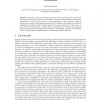674 search results - page 36 / 135 » Preferences in Game Logics |
ICLP
2004
Springer
14 years 1 months ago
2004
Springer
The extended answer set semantics for logic programs allows for the defeat of rules to resolve contradictions. We propose a refinement of these semantics based on a preference rel...
LORI
2009
Springer
14 years 2 months ago
2009
Springer
Abstract. We study games in the presence of an interaction structure, which allows players to communicate their preferences, assuming that each player initially only knows his own ...
AIIDE
2008
13 years 10 months ago
2008
Tactical Agent Personality (TAP) is a modeling concept to capture tactical patterns in game agents, based on a personality concept introduced by Tan and Cheng (2007), to allow beh...
AMAI
2006
Springer
13 years 7 months ago
2006
Springer
Abstract. Recently, notions of equivalence for Answer Set Programming have been studied intensively and were shown to be beneficial for modular programming and automated optimizati...
KR
1989
Springer
13 years 11 months ago
1989
Springer
Research on nonmonotonic and default reasoning has identified several important criteria for preferring alternative default inferences. The theories of reasoning based on each of...

